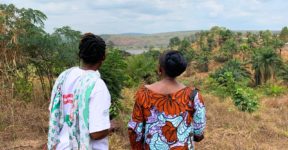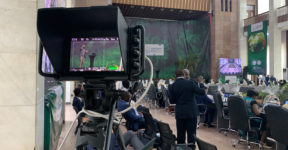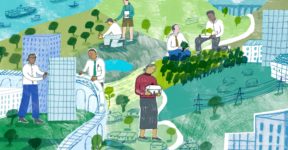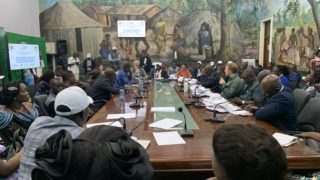
What lessons the DRC can offer world leaders at COP27
Activist Dorothee Lisenga explains what can be learnt from the DRC’s experience reforming the forest sector domestically ahead of COP27.
As an indigenous woman, I am a keeper of traditions that preserve forests. Both indigenous men and women have conserved the Democratic Republic of the Congo's (DRC) forests for millennia, but today, they are under pressure from human activities. We, indigenous people, are now the firefighters safeguarding its integrity.
We face a multitude of challenges in protecting our forests. High levels of corruption enable widespread illegal exploitation of our forests, which leads to land grabbing for mining, oil, logging and more, forcing the displacement of local communities and destroying their livelihoods. Consequently, wars and armed conflicts expropriate local and indigenous communities from their lands and forests which increases land insecurity.
Green spaces are gradually being urbanized and sacred sites and high conservation value community forests are being destroyed by mining, oil and hydrocarbon exploitation. These challenges are all exacerbated by poor regulatory enforcement. Between 2010 and 2020, deforestation rates in the DRC, although low, have doubled compared to the previous decade.
In an attempt to address these challenges, the DRC government implemented the National Forest Code for forest governance in 2006. This is the first global legislation based on the concept of free, prior and informed consent to ensure the participation of local communities and indigenous peoples in forest governance processes.
I spend my time working with indigenous communities so that they can participate in decision-making regarding the forest and the allocation of land and multiple-use forest areas. Good forest governance is essential for sustainable development but it is only possible if it is based on principles of justice and equality for those who live and work in the forests. This requires close cooperation between governments, communities, civil society and the private sector.
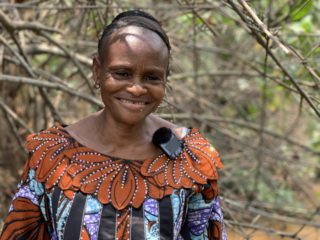
Dorothée Lisenga, pictured, works for the Women's Coalition for the Environment and Sustainable Development. Photo: T. Kanashiro Uehara.
The illegal timber trade, for example, undermines sustainable forest management and leads to deforestation and loss of revenue for our government and our citizens. It is estimated that more than two-thirds of recent tropical deforestation has taken place illegally while illegality results in tens of millions of dollars in lost revenue worldwide each year. There is no doubt that the Forest Code is historic legislation but the problem is that it is not effectively implemented on the ground.
We must understand that the climate crisis is linked to the exploitation of our forests as well as reinforced, and further aggravated, by the transition from fossil fuels. The DRC has taken the decision to sign agreements for the official sale of 27 oil blocks, and three gas blocks, from 28-29 September 2022 so that fossil fuel companies can come and invest in our country. But this has a deplorable effect because the agreements often signed and ratified bring the country back into chaos. These oil blocks cross protected areas and heritage areas of local communities and indigenous peoples and engage in lucrative activities.
To truly implement the measures provided for by the Forest Code, we must strengthen the capacity to safeguard forests and strengthen the monitoring system in this area, in order to be able to detect abuses and find solutions.
Other countries should take advantage of the Congolese experience in the development of the Forest Code. They should develop strong legislation that is accompanied by adequate measures and the implementation of activities on the ground. It is vital that these measures protect forests as well as people who live in the surrounding environment.
At COP26 in 2021, donors pledged $1.7 billion to protect and maintain the forest of the Congo Basin. This funding is a strong signal for donor support to forests rich in biodiversity which is essential for mitigating and adapting to climate change.
This region is the greatest source of terrestrial biodiversity in the world as well as a source of timber and other products and, above all, a home and a source of livelihoods for millions of people. But, without stronger forest governance policies that support local and sustainable development, this investment risks falling short of its objective.
With COP27 less than six months away, the time has come for governments to redouble their efforts to protect our forests. The Congo Basin is one of the most important ecosystems on the planet and it must be at the heart of the negotiations at COP27.
This year, COP27 is one of the first in Africa and a meeting of great importance for the continent. Several questions will revolve around the sustainable development of the continent.
Since COP21 in Paris in 2015, there have been agreements ratified and commitments made that are not respected by some countries. We need concrete action taken together with local communities and indigenous peoples. In order to successfully fight climate change, governments should know how to consider market-based solutions in terms of compensation and damage for a more equitable ecological transition.
We must build alliances between international businesses, governments and local people so that indigenous groups can access the $1.7 billion pledged at COP26 and civil society organizations can continue to protect the forests of the world.
